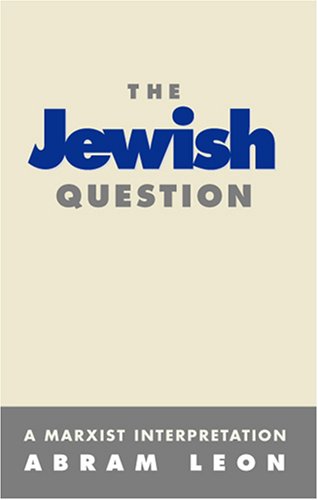Formats Available:
Showing posts with label Religion. Show all posts
Showing posts with label Religion. Show all posts
Sunday, March 15, 2015
Roland Boer, Criticism of Earth: On Marx, Engels and Theology
Formats Available:
Tuesday, September 2, 2014
Eduardo Mendieta, The Frankfurt School on Religion: Key Writings by the Major Thinkers
Eduardo Mendieta, The Frankfurt School on Religion: Key Writings by the Major Thinkers
Formats Available
Wednesday, July 16, 2014
Abram Leon, The Jewish Question: A Marxist Interpretation (1942)
Formats Available:
Online (marxists.org)
Wednesday, May 15, 2013
Catherine Cook, Adam Hanieh, Adah Kay, Stolen Youth: The Politics of Israel's Detention of Palestinian Children (2004)
Catherine Cook, Adam Hanieh, Adah Kay, Stolen Youth: The Politics of Israel's Detention of Palestinian Children (2004)
Formats Available
Israel Shahak, Norton Mezvinsky, Jewish Fundamentalism In Israel: New Introduction by Norton Mezvinsky (2004)
Israel Shahak, Norton Mezvinsky, Jewish Fundamentalism In Israel: New Introduction by Norton Mezvinsky (2004)
Formats Available
Naseer Aruri, Palestinian Refugees: The Right of Return (2001)
Naseer Aruri, Palestinian Refugees: The Right of Return (2001)
Formats Available
Jeff Halper, An Israeli in Palestine: Resisting Dispossession, Redeeming Israel (2008)
Jeff Halper, An Israeli in Palestine: Resisting Dispossession, Redeeming Israel (2008)
Formats Available
Baruch Kimmerling, Clash of Identities: Explorations in Israeli and Palestinian Societies (2008)
Baruch Kimmerling, Clash of Identities: Explorations in Israeli and Palestinian Societies (2008)
Formats Available
Jonathan Cook, Blood and Religion: The Unmasking of the Jewish and Democratic State (2006)
Jonathan Cook, Blood and Religion: The Unmasking of the Jewish and Democratic State (2006)
Formats Available
Baruch Kimmerling, The Invention and Decline of Israeliness: State, Society, and the Military (2001)
Formats Available
Ghada Karmi, Married to Another Man: Israel's Dilemma in Palestine (2007)
Ghada Karmi, Married to Another Man: Israel's Dilemma in Palestine (2007)
Formats Available
Eyal Weizman, Hollow Land: Israel's Architecture of Occupation (2007)
Eyal Weizman, Hollow Land: Israel's Architecture of Occupation (2007)
Formats Available
Norman G. Finkelstein, This Time We Went Too Far (2010)
Norman G. Finkelstein, This Time We Went Too Far (2010)
Formats Available
For the Palestinians who live in the narrow coastal strip of Gaza, the December 2008 Israeli invasion was a nightmare of unimaginable proportions: in the 22-day-long action 1,400 Gazans were killed, several hundred on the first day alone. More than 6,000 homes were destroyed or badly damaged. The cost of the destruction and disruption of economic life, in one of the world’s poorest areas, is estimated at more than $3 billion.
And yet, while nothing should diminish recognition of Palestinian suffering through these frightful days, it is possible something redemptive will emerge from the tragedy of Gaza. For, as Norman Finkelstein details, in a concise work that melds cold anger with cool analysis, the profound injustice of the Israeli assault has been widely recognized by organizations impossible to brand as partial or extremist.
Amnesty International, Human Rights Watch, and the UN investigation headed by Richard Goldstone, in documenting Israel's use of indiscriminate and intentional force against the civilian population during the invasion (100 Palestinians died for every one Israeli), have had an impact on traditional support for Israel. Jews in both the United States and the United Kingdom, for instance, are beginning to voice dissent, and this trend is especially apparent among the young.
Such a shift, Finkelstein contends, can result in new pressure capable of moving the Middle East crisis towards a solution, one that embraces justice for Palestinians and Israelis alike. The seeds of hope were thus sown in the bitter anguish of Gaza. This Time We Went Too Far, written with Finkelstein’s customary acuity and precision, will surely advance the process it so eloquently describes.
And yet, while nothing should diminish recognition of Palestinian suffering through these frightful days, it is possible something redemptive will emerge from the tragedy of Gaza. For, as Norman Finkelstein details, in a concise work that melds cold anger with cool analysis, the profound injustice of the Israeli assault has been widely recognized by organizations impossible to brand as partial or extremist.
Amnesty International, Human Rights Watch, and the UN investigation headed by Richard Goldstone, in documenting Israel's use of indiscriminate and intentional force against the civilian population during the invasion (100 Palestinians died for every one Israeli), have had an impact on traditional support for Israel. Jews in both the United States and the United Kingdom, for instance, are beginning to voice dissent, and this trend is especially apparent among the young.
Such a shift, Finkelstein contends, can result in new pressure capable of moving the Middle East crisis towards a solution, one that embraces justice for Palestinians and Israelis alike. The seeds of hope were thus sown in the bitter anguish of Gaza. This Time We Went Too Far, written with Finkelstein’s customary acuity and precision, will surely advance the process it so eloquently describes.
Eugene L. Rogan, Avi Shlaim, The War for Palestine: Rewriting the History of 1948 (2007)
Eugene L. Rogan, Avi Shlaim, The War for Palestine: Rewriting the History of 1948 (2007)
Formats Available
Gregory Harms, Todd Ferry, The Palestine-Israel Conflict: A Basic Introduction (2008)
Gregory Harms, Todd Ferry, The Palestine-Israel Conflict: A Basic Introduction (2008)
Formats Available
Norman G. Finkelstein, The Holocaust Industry: Reflections on the Exploitation of Jewish Suffering (2003)
Norman G. Finkelstein, The Holocaust Industry: Reflections on the Exploitation of Jewish Suffering (2003)
Formats Available
Jacqueline Rose, The Question of Zion (2005)
Jacqueline Rose, The Question of Zion (2005)
Formats Available
Norman G. Finkelstein, Beyond Chutzpah: On the Misuse of Anti-Semitism and the Abuse of History (2008)
Norman G. Finkelstein, Beyond Chutzpah: On the Misuse of Anti-Semitism and the Abuse of History (2008)
Formats Available
Baruch Kimmerling, Joel S. Migdal, The Palestinian People: A History (2003)
Baruch Kimmerling, Joel S. Migdal, The Palestinian People: A History (2003)
Formats Available
John Rose, The Myths of Zionism (2004)
John Rose, The Myths of Zionism (2004)
Formats Available
Subscribe to:
Posts (Atom)



.jpg)
.jpg)
.jpg)
.jpg)
.jpg)
.jpg)
.jpg)
.jpg)
.jpg)
.jpg)
.jpg)
.jpg)
.jpg)
.jpg)
.jpg)
.jpg)
.jpg)